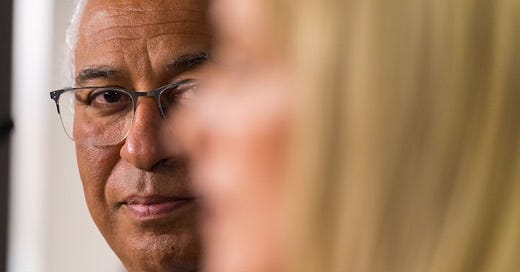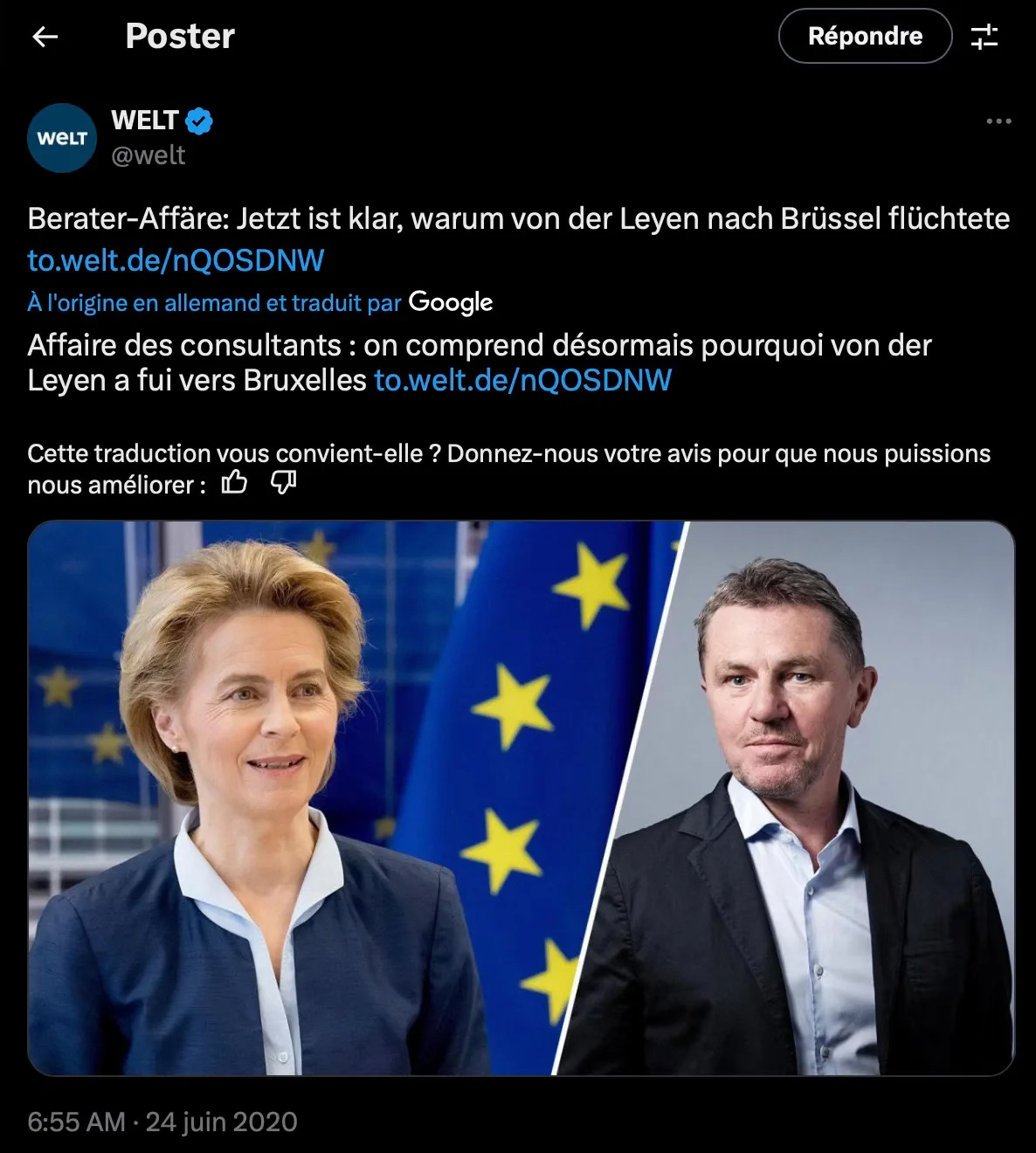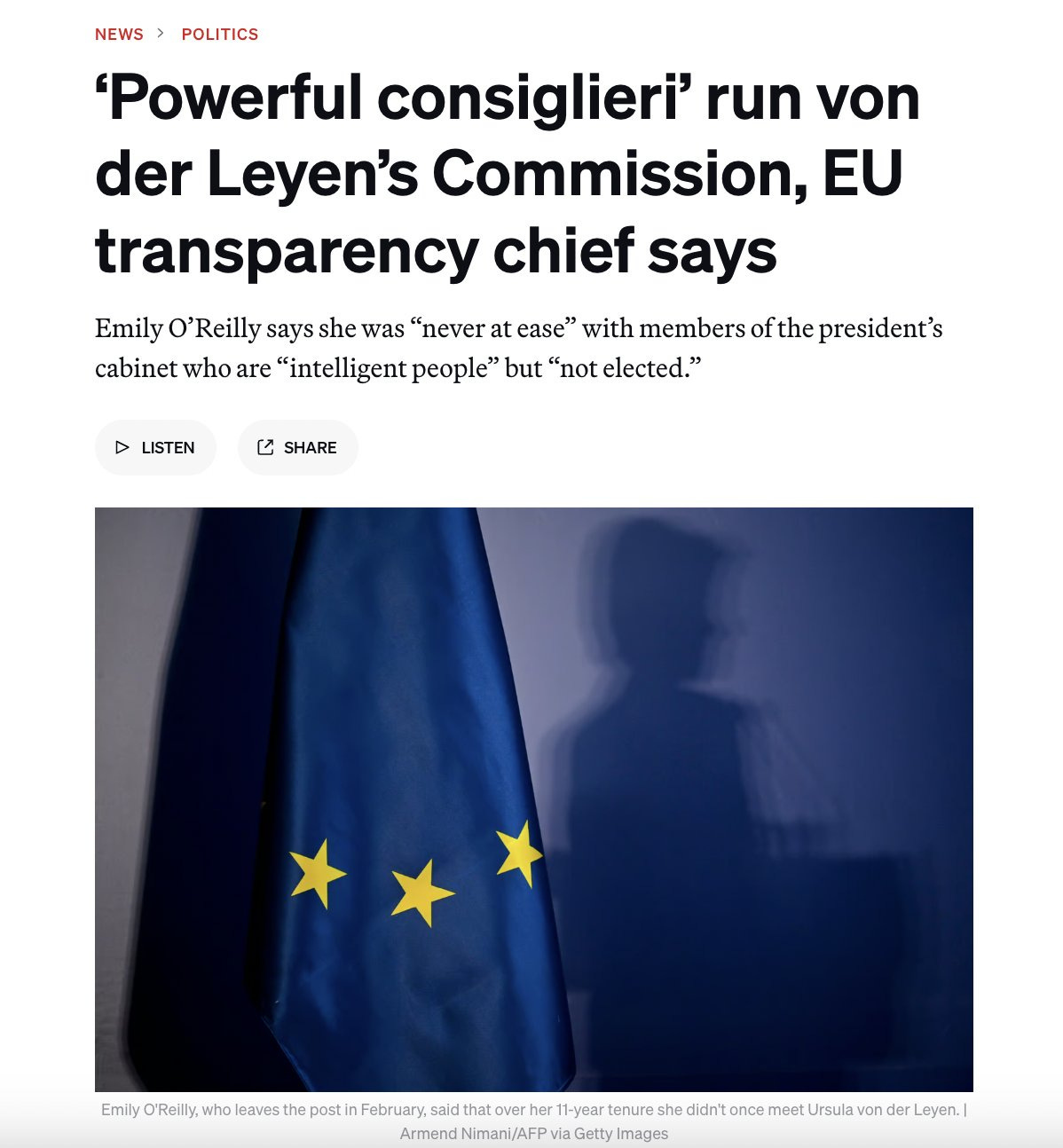Brussels, a recylcing bin
Facing criminal investigation in his own country, the Portuguese ex PM Antonio Costa has been appointed head of the European Council. Off-ground tag? It wouldn't be the first time.
What do Ursula von der Leyen, Roberta Metsola, and Antonio Costa have in common? They all lead one the three main European institutions. Respectively President of the European Commission, President of the European Parliament, and President of the European Council. Institutions whose mission is to further the common interests of the Union and its member states.
We’re no party-poopers, but it looks like that common interests can sometimes be quite vested.
Take Antonio Costa, the newly appointed President of the European Council, the EU sole decision making body. He took office on December, 1st. In Portugal, this former socialist Prime Minister has been linked to numerous corruption scandals.
The latest involves alleged trafficking of permits for lithium mining and the manufacturing of green hydrogen. The public prosecutor’s office listed crimes being investigated as "embezzlement, active and passive corruption of public and elected officials, and influence peddling”.
Several individuals have already been indicted, including Antonio Costa's chief of staff (under arrest warrant), the Minister of Infrastructure, as well as the head of the Portuguese Environmental Protection Agency. Antonio Costa denied any involvement, resigned and campaigned successfully for the Presidency of the European Council. At this stage, we are requiered to believe him and not to discuss his exfiltration to Brussels. Even though in Europe political corruption and white collar crimes seldom lead to convictions and even more seldom end political careers.
“In 100% of financial and corruption case, the perpetrator claims his innocence. You will never experience a white-collar criminal or a politician come clean to the stand and say : “I committed a crime” confided former French general prosecutor Jacques Dallest to L’Eclaireur.
Antonio Costa is a person of very high interest. The public prosecutor has launched an independent investigation into the former Prime Minister, suspected of having personnally intervened "to cut red tape" with regards to the mining and hydrogen permits.
Yet Antonio Costa must get the benefit of the doubt and we must look beyond the borders of Portugal : this case intersects with a lot.
Portugal sits on the largest lithium reserves in Europe. This metal is highly sought after. It is critical to the manufacturing of electric vehicle (EV) batteries, one of the EU Commission's pet projects, alongside … hydrogen. At the 4th Renewable Hydrogen Summit in November, Ursula von der Leyen reiterated her enthusiasm- not widely shared - for “decarbonized hydrogen”.
Concomitantly, the newly appointed EU Commission Vice-President in charge of a “clean, fair, and competitive transition,” the Spaniard Teresa Ribera, refused to postpone the ban on internal combustion engines scheduled for 2035. Thus confirming the shift towards “decarbonization” of transport and its corollary, the electric car. Despite the vocal warnings against the daunting consequences this hasty decision - taken without any proper impact study - will have on European economies.
Antonio Costa's appointment does not dispel doubts about his integrity. Yet it is politically and ideologically consistent: to reach its “decarbonization” goal, the EU aims at a share of 25% of the global manufacturing of EV batteries by 2030. With a view to minimize dependencies, particularly on China. There is not a wide array of options: lithium mines must be opened.
All that is of course a tad more complicated. In addition to the EU having fewer lithium reserves than its Chinese and even American competitors, lengthy prospection, environmental concerns and a weak acceptance among the public, for whom energy prices is of major concern, is already cooling down some ambition...
The conondrum to crack is whether European institutions are merely a vast recycling operation. It is to say the least troubling to notice that what is a clear breach of integrity at home (understood as in one’s home country) is not at EU level, where the fight against corruption amounts to little more than a slogan.
Take Roberta Metsola. The President of the European Parliament has made fighting corruption her platform in her home country, Matla, a 500 000 inhabitants tax heaven and off-shore centrer marred by perpetual scandals. Remember the 2017 assassination of investigative journalist Daphne Caruana Galizia, who was investigating corruption cases. More recently, former Prime Minister Joseph Muscat has been investigated for corruption in the privatization public hospitals and had to resigned as a result of his entourage possible involvment in Mrs. Caruana’s murder.
Roberta Metsola was not involved (so far) in the far-reaching Qatargate corruption scandal. Investigations are stagnating enough to suggest that charges may eventually be dropped by the prosecution, as in many corruption cases in Belgium, one of the EU most corrupt country and a major money laundering center.
But Metsola had a new code of ethics adopted. It requires MEPs to declare conflicts of interest, including those related to "family, emotional, or economic interests". But Ms Metsola has made sure that this code does not apply to her. As Politico revealed, her husband, Ukko Metsola (a finish liberal politician), is the "chief European lobbyist for the Royal Caribbean Group”, based in Miami, the world’s second-largest cruise company and a major polluter…
Ms Metsola’s role may not be limited to securing privileges. As the late MEP Michèle Rivasi underlined, not much is heard from the European Anti-Fraud Office (OLAF).
“We have over fifty files on members of the European Parliament. We have damning evidence of corruption. OLAF has been coxed by the ethics committee and by the President of EP,” charged Michèle Rivasi in September 2023, echoing a conversation she had with the head of OLAF.
Is Mrs Metsola covering up MEPs’ crimes? In the meantime she was re-elected with an large majority. She thus enjoys parliamentary immunity – which protects her from “arbitrary political prosecution” – but, more importantly, she benefits from the inviolability of the European institutions’s archives. Yes, you’re read correctly. No prosecutor of any EU member state can serve search warrants on any EU institution.
Take (again) Ursula von der Leyen. Pinced in a parliamentary report for her actions as Minister of Defense, she was never further investigated . The report was damning, highlighting close to 100 million of euros in government contracts granted to consultants without competition, and oversight, setting out collusion and cronyism.
Ursula von der Leyen left Berlin for Brussels and took (though not fulfilling the criterion, she was not the “Spitzenkandidat”, i.e. the head of the largest EU political group at the European Parliament) the presidency of the European Commission’s job. A quick exfiltration? Nothing conspiratorial about that. The head of investigations at Die Welt (the German equivalent to the New York Times ) wrote: "There is no longer much doubt about the real reason that pushed Ursula von der Leyen to flee to Brussels."
What about the PfizerGate ? At the EU court of Justice (EUCJ) on November, 15th 2024, the European Commission justified its refusal to make public the SMS between Ursula von der Leyen and Albert Bourla, Pfizer’s CEO. As they were negociating one to one the purchase of billions worth of Covid vaccines, the Commission main argument is that these text messages are not that important. Marc van der Woude, the president of the tribunal, did not give any date for the upcoming court decision with these very words : “it’s surprising that a series of mundane text messages are prompting interest so many”
Politico Europe, now the property of the powerfull German publishing conglomerate Axel Springer, published an interview of the out-going EU Ombudswoman Emily O’Reilly in which she implies that Mrs. von der Leyen’s ways are comparable to those of the Mob.
Off-groud tag? Two days after the end of his term as European Commissioner for Justice, the former Belgian Foreign Affairs Minister Didier Reynders was questioned by the police and his home searched as part of an investigation into suspected money laundering over several years. He was accused in September 2019, three months before being appointed European Commissioner, of having taken taking bribes for public procurement contracts. The case was swiftly dismissed.






